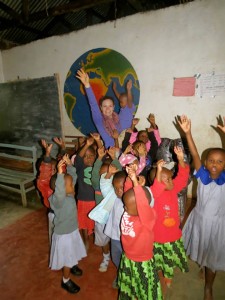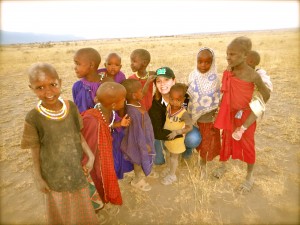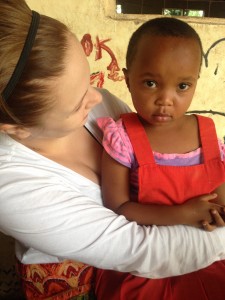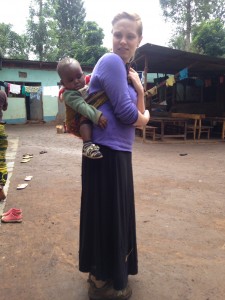My guest this week is a young college student, Halie Putorek, whom I first read of in an article she wrote in her school paper about her trip to Tanzania. I loved how she addressed the cultural differences she found there, so, of course, I reached out to grab her for my blog.

Halie is in the midst of final exams this month, so when she gets here to say hello, we can be particularly welcoming.
Here’s her bio:
Halie is a West Virginian through and through, with two younger sisters, two loving parents, and an incredibly supportive extended family and friends. She attends Marshall University in West Virginia, and graduates this December with a Bachelor of Arts degree in Psychology and a minor in Sociology.
In addition to both hearing and telling stories of all kinds, Halie enjoys singing in Marshall’s chamber choir, playing guitar, spending time with her family and friends, being outdoors, and traveling. She feels happiest, however, when she makes new friends whilst attempting to serve others.
She has traveled to Mexico, Tanzania, and numerous locations around the United States while participating in volunteer services. Her future goals include becoming a mom, finding a career focused in service and aid to others, and continuing to encourage others to volunteer sustainably – both internationally and domestically.
You can read more about her incredible journeys at
http://www.haliewanders.wordpress.com
www.marshallparthenon.com (search “Halie Putorek”)
Facebook (halie.putorek)
Twitter (hey_lee93)
Culture Shock
As I walked into my Race, Culture and Development course on the first day of my semester, I noticed a few things in particular. I noticed an overwhelming presence of African American members of sports teams that were in the class. I also noticed the somewhat obvious separation.
The white population took up the middle of the classroom, leaving our African American peers with the outer seats. I realized somewhere deep in my soul, however, that we as Americans have become so used to separation and discrimination that this seating arrangement would seem “normal” to most people.
However, due to the very nature of this class, the very first words out of my teacher’s mouth was something to the effect of: “Does anyone else notice anything wrong with the way you are all seated?” Everyone looked around, some chuckled lightly, while some looked surprised.
This past June, I had the opportunity to volunteer in Moshi, Tanzania for four weeks. I found myself acting in the role of “mwalimu,” or English teacher, to approximately twenty young students whose ages ranged from two to six. My students were what you would expect: eager to learn, eager to play, and eager to unknowingly teach this eager “mzungu” more than she could ever anticipate.

“Mzungu” is a Swahili word that literally translates into “white person.” I wonder if any of you reading this have ever felt like a celebrity? Have you heard your name shouted over and over? Have you been the victim of unwanted attention, glares, and even sometimes-angry words?
How about unearned compliments and thanks? Believe me when I say, if you have never experienced this first hand, that celebrity status is never as glamorous as they make it seem in movies. In fact, while in Tanzania, I didn’t actually have a name. I was a minority group, a “mzungu,” and more often than not, “Dada,” or sister. But even if one of my friends knew my name or called me sister, I was still a member of a minority group that brought the stigma of being full of untapped intelligence, funds, and chocolate.
My students sometimes liked to refer to me as “mzungu” if they thought I wasn’t paying attention to them. Body language, lucky for me, is an incredible cross-cultural tool with which I became well acquainted whilst in Moshi. I would simply look at my students after they called me “mzungu” and they immediately returned to “mwalimu” or simply Halie (pronounced Hay-Leeeeee). One time, I even went so far as to insist that I was not a mzungu at all. That naturally received skeptical looks and giggles.

Why am I telling you these stories, you may ask? Well, friends, we are standing at a crossroad of sorts. Every day on the news, stories of discrimination and racially motivated hatred fill the screens. I find myself saddened and scared for the future of our world. I live in an area of the country particularly susceptible to narrow-mindedness. I say this, however, being proud of where I come from.
I blame lack of education and perspective in most instances of prejudice. People are much like trees, I’ve found. They become most rooted in the soil that feeds their beliefs and ideologies. If one plants roots in soil consumed with prejudice and misunderstandings, that is the type of tree one becomes.
Somehow, I’ve always felt like a palm tree among evergreens that insist on remaining the same – year in, year out. I am the lucky one, as I’ve always felt compassion and equity in regards to people that may look and act differently than me.

My time in Tanzania was much more than any number of titles and “names,” however. I was able to climb a part of Mt. Kilimanjaro, visit a Massai tribe, go on Safari, and interact with local Tanzanians on a familiar level in some instances. Even now, months later, I look back on my time in Tanzania with an urgent desire to return. I feel very sure that I am not finished learning from the incredible people I met.
While I was in Tanzania, I had the opportunity to write for my school paper, as well as blog on a regular basis. I have come to appreciate the immense importance of spoken and written word. All of the class discussions in my Race, Culture and Development class remind me of a very important fact: each individual is the product of their life experiences.
I am so fortunate I have seen what I have seen, and learned what I have learned. In one of my blog posts, I reiterate my deep love of Tanzania. I wanted to include this, as an example of the importance of cross-cultural exploration and understanding. Our world only works when we accept other cultures and when we embrace the idea that we as individuals might not know as much as we think.
“Take a few moments during the day to look out at the world around you. Know that you are totally insignificant, and realize that at most, you only find individual significance in those closest to you. Your friends and family recognize your worth and value, and they certainly love you. Those people that find value in you, in turn gain significance from those around them. In this way we are all connected. This connection between individually insignificant people is the catalyst of change. Without the realization of personal insignificance, nothing will change for the better.
I truly believe that when my time on Earth is finished, I will wind up back in Tanzania – Mount Kilimanjaro standing majestically amongst the endless fields of sunflowers and corn. At night, before I close my eyes, my mind takes me back to the Karanga Village near Moshi Town. I hear the birds singing and the children shouting with fervency and zeal – so real it is as if they await my reply.
I can imagine no finer place to spend eternity than East Africa. To be immersed in a culture of such joy, with people of such integrity and hope, would be the best of blessings. There may be problems and struggles to overcome, but no one was ever so welcomed or so loved in all the world as I was during my time in Tanzania.”
Thank you, Halie, for sharing your love of Tanzania with us, and your recognition of the important of staying open to and curious about differences.
How about you? What are your questions or comments for Halie?
 [/box]
[/box]
Ian Mathie
Africa is like the Guinea worm: once it gets under your skin you can’t easily get rid of it, for it just keeps burrowing into your substance and becomes a part of you. Haile’s article so clearly demonstrates this and it makes my heart glow to know there’s another lovely person infected this way.
The most poignant words she wrote are: Our world only works when we accept other cultures and when we embrace the idea that we as individuals might not know as much as we think. As a psychology student she will easily marry this to Karl Popper’s dictum that the more we learn the more we realise how ignorant we are for we see how much more there is to learn. So it is with cultures: we tend only to see what out prejudices allow us to see, and this is who so many people have difficulty settling in when they go abroad.
Haile obviously looked over the fence with open eyes, and what she saw was beauty. It’s always there for those who are willing to see, but most look with closed eyes and ears, and so they suffer from culture shock.
An appetite for the new and an openness to sharing are the keys to cross cultural success. Haile definitely makes the grade.
Halie Putorek
Ian, thank you for your kind words. I have found comfort, in the months after my return to the US, in other individuals who feel the same love and passion about the continent and countries I feel so much love for. Where have you traveled in Africa?
Ian Mathie
I spent 30 years there, starting when I was three in Northern Rhodesia and later, after military service, going back to work as a rural development officer. Over the years I’ve been to most African countries. I’ve written a little about it in one or two books. My website will tell you more.
Janet Givens
Hi Ian, I realized with your comment this morning, that I have never met a Westerner who has lived in Africa and didn’t feel a tie to the continent, not necessarily the country they were in. It sounds quite magical. Any idea WHY that is? What is it about Africa that seems to reach out and grab one and not let go. Like a Siren’s song. The vast majority of Peace Corps memoirs, I found, are from Africa too. Thanks, as always, for stopping by.
Ian Mathie
I started in Africa at such a young age, Janet, that it crept into my soul from the beginning. Africa becomes part of you if you live like that, just as Virginia or wherever it was is part of Haile’s soul. Then add to that beginning years of exposure to life lived in all its dimensions and it becomes inescapable.
Westerners tend to separate life into compartments, and often ignore whole segments. Africans don’t separate the daily mundane physical aspects from the spiritual, and this makes a difference. They are both more pragmatic and more fulfilled as a result and this, I think, is one of the key elements that makes their continent and all it holds so attractive to outsiders. There is a magic about life, and it’s not just the sorcery kind of magic I’m talking about here, that attracts people who aren’t already part of it.
Does that answer your question?
If you want to know more about the sorcery kind of magic, there’s a bit in my recent book Sorcerers and Orange Peel that might interest you. The book was recently listed by The Bookbag as one of the ten best autobiographies of 2014, if that’s any recommendation.
Kathleen Pooler
Hallie, thank you for sharing your African experience and your wisdom about breaking down cultural barriers. You have a rich and valuable story to tell. My favorite line:”Our world only works when we accept other cultures and when we embrace the idea that we as individuals might not know as much as we think.” It seems to me that anyone who has been to Africa shares the same fascination with the hospitality and generosity of the people as well as the beauty of the land in sharp contrast to the civil unrest, disease and poverty we hear about in the news. Thank you for introducing us to Hallie and her impressive mission and love of Tanzania. Janet. Memoir Author Cindy McVey shares a similar love of Zimbabwe, its land and its people. Her memoir is TO LIVE IN PARADISE: DREAMS FOUND AND LOST IN THE HEART OF AFRICA from Homebound Publications. Bravo to Hallie for a job well done.
Halie Putorek
Kathleen, thank you for taking the time to read about my trip. I appreciate your input and encouragement. I hope you will stop by my blog (link above) to read about more of my journey in Tanzania. I am so grateful for people like you who find value in others’ experiences.
Kathleen Pooler
My pleasure,Halie. I i will be checking out your blog. Keep up your great work. it is very inspirational.
Janet Givens
Thanks for the reference, Kathy. I checked it out on Amazon and it looks compelling. You’ve done a Google + Hangout with Cindi. I’m sorry I missed it. Perhaps you can entice her to do a guest post on your blog?
So glad you enjoyed Hallie’s post. You chose my favorite quote too. “… the idea that we as individuals might not know as much as we think.” Indeed, a difficult moment for us all at times.
Kathleen Pooler
Janet, I think Cindi would be a great match for your blog and message.I’ll be happy to introduce you if you are interested. We can talk via email.Here’s the link to the Google+ Hangout interview:http://krpooler.com/memoir-2/to-live-in-paradise-an-interview-with-memoir-author-cindi-mcvey
Janet Givens
Ian
“Africans don’t separate the daily mundane physical aspects from the spiritual, and this makes a difference. . . There is a magic about life, and it’s not just the sorcery kind of magic I’m talking about here, that attracts people who aren’t already part of it.”
I think you nailed it. Thank you.
Looking Behind So I Can See Ahead More Clearly |
[…] Halie Putorek […]